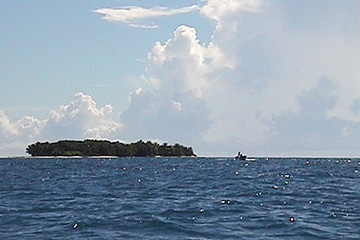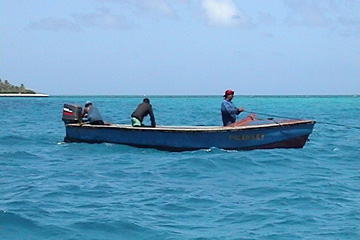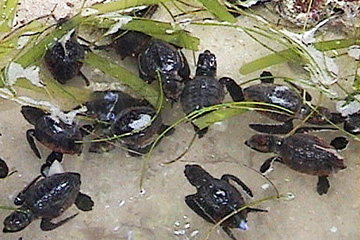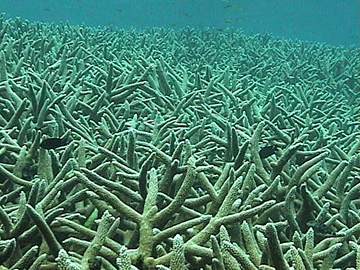Oil plans put wildlife, people, and award-winning sustainability efforts in the Colombian Caribbean at risk.
The Seaflower Marine Protected Area (MPA), which recently won top honors at the Convention on Biological Diversity (CBD) in Japan, is now under threat by planned oil exploration in the region, according to the Providence Foundation which is devoted to protecting the area. Proposed blocs for exploration by the Colombian government lie in the North Cays adjacent to the park, and perhaps even inside MPA boundaries. Spreading over 65,000 square kilometers (6.5 million hectares), Seaflower MPA lies within the Colombian Caribbean department known as the Archipelago of San Andres, Old Providence and Santa Catalina. This richly diverse Archipelago is home to a known 57 coral species, over 400 fish, and some 150 birds, as well as the ethnic and cultural minority: the Raizal people. The prospect of massive infrastructure or, even worse, oil spills in the area could devastate the park and locals’ livelihoods.
 Typical landscape in the Archipelago. Photo courtesy of Providence Foundation. |
“Confirmation by the National Agency of Hydrocarbons of the oil prospection in the North Cays […] constitutes an atrocity that will be committed against nature, the native population of the islands and the entire world. The Archipelago is a Patrimony of Humanity, recognized by UNESCO since 2000,” June Marie Mow, Executive Director of the local organization Providence Foundation, told mongabay.com, referring to proposed oil prospecting as “environmental and social aggression”. Providence Foundation has set-up a petition against Colombia’s oil plans, but many locals are concerned the government will remain deaf to concerns.
“[Planned oil prospecting] is a clear statement of the Colombian government to the community of San Andres Island. The people of San Andres, have no voice or an opinion. Our culture and our wellbeing is insignificant to the Colombian Government,” said local Freddy Velez.
Seaflower MPA was established by the Colombian governmental agency known as Coralina with active participation from the local community. The innovative MPA marries conservation with sustainable fishing and harvesting for local people. At the CBD conference in Nagoya, Japan, the Colombian agency, Coralina, beat out over 1,000 other organizations, both governmental and non-governmental, for its ground-breaking efforts in sustainability.
  Top: Fishing in the Archipelago. Bottom: Newly hatched marine turtles in the Archipelago. Photos courtesy of Providence Foundation. |
“The intention is to open an umbrella of possibilities of livelihoods, including low-impact aquaculture, and some alternatives on land such as iguana farming which is done by the fishers in some places, and also creating interpretation trails [for tourism],” Coralina’s General Director, Elizabeth Taylor Jay, told the BBC after the award was announced.
However, Mow says that if oil prospecting goes ahead, which includes both on-shore and off-shore oil drilling plans, it would threaten all that Coralina has accomplished. Mow adds that the Colombian government would be breaking its Biosphere Reserve Declaration which “recognizes the importance of the natural and cultural patrimony of the islands and also defends the idea of a sustainable development that guarantees the local population wellbeing.”
According to maps seen by mongabay.com, oil prospecting would occur in the North Cays, which is home to some of the largest coral reef banks in the Caribbean, as well as important nesting spot for vanishing marine turtles. Four species of sea turtles are present in the Archipelago: loggerhead turtles (Caretta caretta), hawksbill turtles (Eretmochelys imbricata), green turtles (Chelonia mydas), and, the world’s biggest, leatherbacks (Dermochelys coriacea). Two of these—the loggerhead and green—are listed as Endangered by the IUCN Red List, while the leatherback and hawksbill are considered Critically Endangered. Two fish in the region are also considered Critically Endangered: the Warsaw grouper (Epinephelus nigritus), the Atlantic goliath grouper (Epinephelus itajara), and the stunning largetooth sawfish (Pristis perotteti).
Seaflower MPA’s flagship species, however, is the magnificent mollusk, the queen conch (Strombus gigas), which has been decimated by overfishing and poaching both for food and sale of shells. Currently the queen conch is being raised in pens in the park and then released into the wild.
 Coral reef in the Archipelago. Photo courtesy of Providence Foundation. |
However, Mow says oil exploration will impact more than wildlife. The population of the Archipelago, numbering around 80,000 today, were once dominated by the Afro-Caribbean Raizal people, however recent migrations of Colombians, promoted by the government, has effectively split the population. Tensions between the Raizal people and the Colombian government have been high historically including the formation of a number of separatist movements. Oil exploration, by a government that many locals deem as distant, could further aggravate such tensions as well as undercut local economic initiatives based on sustainability and ecotourism.
“We got a different system ‘we no waan’ that kind of unsustainable behavior here!” Julian Escobar says in the regional Creole English, referring to oil exploration.
“I cannot fathom Colombian Oligarchy’s greed,” adds another local, Allan Bowie. “This is a clear move to continue to impoverish and exterminate our existence.”
Related articles
Colombian marine reserve receives top honors at global biodiversity meeting
(10/20/2010) Coralina, a Colombian government agency that established the Seaflower Marine Protected Area (MPA) with local community involvement, is being heralded today by the Convention on Biological Diversity (CBD) in Nagoya, Japan. Proving that conservation and sustainable economic opportunities can go hand-in-hand, Coralina was instrumental in creating a marine park that protects nearly 200 endangered species while providing sustainable jobs for local people in the Western Caribbean Colombian department of Archipelago of San Andrés, Old Providence and Santa Catalina. Coralina was one of over 1,000 agencies and organizations that are apart of the Countdown 2010 program, which highlights effective action to save species at the CBD.
Marine managed areas help reverse declining fisheries, create sustainable livelihoods
(09/16/2010) Marine managed areas in developing countries can help reverse declining fisheries while generating long-term benefits for communities, according to a series of reports released by Conservation International (CI). The reports, informed by more than 50 studies and 100 scientists in 23 countries around the world since 2005, evaluate the role of marine managed areas (MMAs) in maintaining ocean health, assess the link between sustainable ocean use and human well-being, and architect what it takes to successfully implement MMAs.

(07/29/2010) “President Obama called it ‘the worst environmental disaster America has ever faced.’ So I thought I should face it and head to the Gulf”—these are the opening words on the popular blog Guilty Planet as the author, marine biologist Jennifer Jacquet, embarked on a ten day trip to Louisiana. As a scientist, Jacquet was, of course, interested in the impact of the some four million barrels of oil on the Gulf’s already depleted ecosystem, however she was as equally keen to see how Louisianans were coping with the fossil fuel-disaster that devastated their most vital natural resource just four years after Hurricane Katrina.